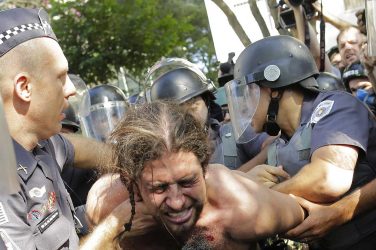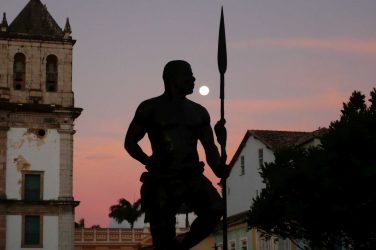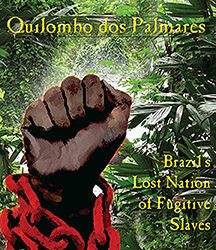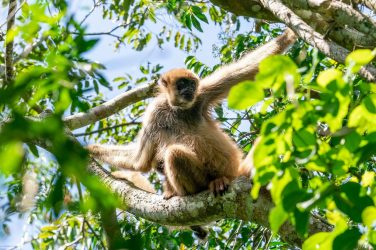In addition to being a politician and a constitutionalist lawyer, President Michel Temer is fond of writing poems, some of which have been published in a book, Anônima Intimidade (Anonymous Intimacy). Before him, other politicians had already ventured into literature.
In 1980, Senator José Sarney managed to get himself a seat – chair No. 38 – at the Brazilian Academy of Letters, in spite of his doubtful literary abilities, as famous writer Millôr Fernandes duly warned.
In some cases, it was the other way around: some great writers ventured into politics. In 1868, for example, when José de Alencar was appointed Minister of Justice, he was already considered the most important novelist of Brazilian Romanticism.
While in Europe this artistic movement was characterized by the idealization of medieval characters, in Brazil the epic characters were indigenous and African slaves. The literary exaltation of these peoples, known as romantic indigenism, aimed at building the cultural identity of a country recently emancipated from Portugal.
One hundred and fifty years after José de Alencar published the famous indigenist trilogy O Guarani (1857), Iracema (1865) and Ubirajara (1874), a new narrative has been established which, far from praising the indigenous peoples as an inseparable component of Brazilian culture, defines them as an obstacle to the country’s development.
A most obvious expression of Brazilian anti-indigenism happened on January, 14, when Resolution 68/17 of the Ministry of Justice was published. Warmly approved by Temer, this resolution was strongly criticized by indigenous and civil society organizations, which pointed out that the intention of the government is to dispossess indigenous peoples of their ancestral territories, through compensation offers.
According to members of the National Council of Indigenous Policy, the aforementioned resolution was adopted by surprise, without any prior dialogue or consultation, thus contradicting the international standards for state decisions affecting the rights of indigenous peoples.
After a statement by the Federal Public Prosecutor questioning the legality of Resolution 68/17, it was replaced by Resolution 80/17, which maintains the main provisions criticized both by the Public Prosecutor and by civil society.
Among other measures, the new resolution creates a political body which can stop and even reverse the land demarcation processes carried out by the National Indian Foundation (FUNAI).
Until last week, FUNAI was the technical entity responsible for identifying indigenous territories. Today, this can be done by other bodies subordinate to the Ministry of Justice, which means that a political filter is being imposed on a decision that, under the rule of law, should be based purely on technical criteria.
It should be noted that anti-indigenism is not an invention of the current government. During the presidency of Dilma Rousseff, indigenous policy was subordinated to the interests of the “ruralist group”, a powerful congressional front of big landowners and agribusiness entrepreneurs. Also, congressmen linked to ultra-religious sectors suggested evangelization as an option for the integration of indigenous peoples into society.
The co-optation of the state by large building companies and corporations in the mining-energy sector added another component to the agony of the indigenous peoples, in whose lands rights were granted for carrying out pharaonic works, such as the Belo Monte hydroelectric plant, a true anti-jewel of Rousseff’s crown.
Her legacy as regards indigenous peoples can be summed up with a speech of January 2015, by the then Minister of Agriculture and current senator Kátia Abreu: “Brazil requires a one-off agrarian reform, since large estates no longer exist in this country. Land conflicts with indigenous people take place because they have left the jungle and have gone down to production areas”.
After years of regression, the current government seems ready to give in even more to the parliamentary fronts that stifled indigenous policy during Rousseff’s administration.
The recent resolution of the Ministry of Justice is just one example of how the rights of historically discriminated populations have been subjected to the corporate interests and conservative positions of the current masters of the Federative Republic of Brazil.
Just look at the ethnic-racial and gender uniformity of Temer’s volatile cabinet, made up mostly of white men and political bosses who are being prosecuted for electoral crimes.
Temer seems to get his inspiration from the politician-poet José Sarney rather than from the poet-politician José de Alencar.
In memory of former Minister of Justice, José de Alencar
Daniel Cerqueira is a Lawyer, Senior Program Officer at the Due Process for Law Foundation (DPLF). Twitter: @dlcerqueira
Erika Yamada is the representative for Latin America and the Caribbean in the Expert Mechanism on the Law of the Indigenous Peoples of the UN.
This article appeared originally in Open Democracy – https://www.opendemocracy.net















